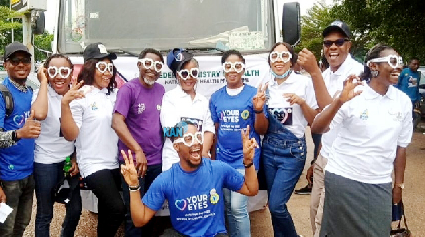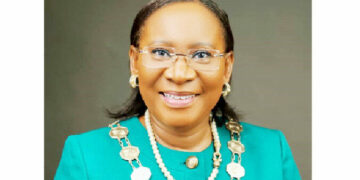A person’s vision may drastically change throughout life due to several internal and external factors, such as genetics or stress. This results in problems known as visual impairment, which is the loss of part or all of one’s ability to see, which in turn, reduces a person’s capability to function.
Experts have cautioned Nigerians against not taking proper care of their eyes considering the importance of the eye to mankind. They also noted challenges, as well as vision impairment, saying it’s on record that over 36 million people are blind across the world.
Also, the National Eye Health Committee attributed 20 percent of all traffic accidents and up to one-quarter of fatal and serious accidents are due to drivers with a diminished vigilance level.
Chairman of National Eye Health Committee, Prof. Afekhide Omoti, stressed that vision is key to achieving safety on roads hence the need for awareness to be created among key stakeholders of public transport, especially the drivers, whose primary responsibility is to convey their passengers safely to their destination.
“As small as these eyes are, they are so important to our well-being and our state of mind and our happiness and loss of eyesight is one of the commonest causes of depression, because when you lose your sight or your sight is becoming impaired, you recognize how important that gift that you had of good sight is or has been,” the commissioner for health, Lagos State, Prof. Akin Abayomi said while urging Nigerians to take care of their eyes.
Abayomi disclosed that eye health, impacts the quality of life, education, employment, and all areas of life of an individual, adding that there is so much to see in this beautiful world but this is only possible if your eyes are in good condition.
As crucial as sight is to a person, it is sad to know that visual impairment is becoming a global problem. A report by the World Health Organization (WHO) in 2019 estimated that about one billion people are living with preventable vision impairment globally.
The situation is worst in low-income countries as most blind people live in Africa, even as WHO Africa, estimated that the region has 15.3 per cent of the world’s blind population.
Unlike wealthy countries where blindness are commonly below 0.5 per cent, a study titled: “Challenges of Ophthalmic Care in the Developing World”, revealed that poor people in the developing world suffer far more blindness and visual impairment than wealthier populations.
WHO Africa also corroborated the study’s findings when it said that an estimated 26.3 million people have a form of visual impairment in the continent, with 20.4 million having low vision and 5.9 million being blind.
In Nigeria, the chairperson, Nigerian Optometric Association, Lagos State Chapter, Dr. Gloria Okoekhian told LEADERSHIP that research has shown that about 4.2 million adults above the age of 40 years have moderate to severe visual impairment or blindness. In other words, four out of every 100 adults over 40 have a moderate or severe visual impairment in Nigeria, Okoekhian revealed, adding that eight out of 10 causes of blindness are avoidable.
Common Causes Of Blindness
Major causes of avoidable blindness stem from the lack of access to effective ophthalmic services, such as cataract surgery, the screening for, and treatment of, diabetic retinopathy, or retinopathy of prematurity, said Okoekhian.
She disclosed that though Nigeria has over 6,000 Optometrists nationwide, this number is not enough to provide adequate care to the growing population of over 200 million. “This number cannot effectively tackle the burden of blindness,” she stated.
The study added that “Newer” blinding problems disproportionately afflict the developing world, such as retinopathy of prematurity, partly because of the dearth of skilled ophthalmic examiners capable of making early diagnoses and acting upon them.
He stated that cataract accounts for 20 million blind people worldwide but disproportionately over 50 per cent of blindness in developing countries. “In many ways, this is just the tip of the iceberg since these numbers do not include those who are blind only in one eye from cataract or the much larger number of those who would benefit from cataract surgery in carrying out their day-to-day activities but are not yet legally blind,” the study revealed.
Tips to prevent avoidable blindness
Eight out of 10 causes of blindness are avoidable if only people pay close attention to their eyes and do the needful by going to check their eyes, Okoekhian said.
She advised regular eye checks, as early detection is key to preventing avoidable blindness, adding that a balanced diet like an intake of plenty of fruits and vegetables (green leafy vegetables) and fish rich in omega 3 fatty acids and proteins, can help to prevent blindness.
“Engage in regular exercise. This may prevent or help to control diabetes, high blood pressure or high cholesterol, and a host of other diseases of the body that can cause serious eye problems. Also, being overweight or obese increases your risk of developing diabetes which invariably poses a risk of developing serious eye problems,” she added.
In the same vein, the health commissioner, Lagos state explained that Nigerians should improve the health of their eyes by eating healthy diets, going for regular eye checks, protecting the eye from injury and trauma, avoiding self-medication, avoiding patronizing quacks and wearing sunglasses that offer UV protection to prevent radiation from the sun damaging the eyes.
Other good eye health care practices according to Abayomi include, avoid playing with sharp objects, avoiding instilling injurious substances into the eyes, avoiding smoking, exercising regularly, visiting only certified ophthalmic eye hospitals if you have eye complaints, wearing only prescribed glasses from an eye care provider and checking and controlling blood sugar and blood pressure levels.
Task before government
“A lot still needs to be done from training to employment, thus we call on the government to create or establish more primary healthcare centers and employ more Optometrists that can take eye care to the grassroots.
“We also call on the government and policymakers to allocate more funds to eye care to make it more accessible, available and affordable to the populace,” Okoekhian averred.
Blindness can be prevented or avoided with proper care, the chairperson of Nigerian Optometrists Association, said, while urging Nigerians to make a pledge today to care for their eyes. “Do not let God’s gift of sight go to waste. “Put your vision first. Love your eyes; save lives,” she said.
In Lagos State, the state commissioner disclosed that the state government through its Blindness Prevention Program has screened over 600,000 people for eye defects, offered free eyeglasses to 240,000 citizens, and provided free surgical intervention to 30,000 others across the state.
“The Lagos state Ministry of Health has a very large eyesight program. In the last years, we have reached out to over 600,000 people to examine their visual capacity, and out of that group, about 240,000 have received free refractory eyesight glasses which have been able to transform their inaccurate vision to good visual perception. Also out of that number, about 30,000 have received free surgical intervention to either remove a cataract or to repair the damage caused by raised eyeball pressure that we call glaucoma or some kind of laser treatment that corrects the problems caused by sickle cell disease, hypertension, and diabetics,” he said.
Abayomi however lent his voice to the need for citizens to improve the health of their eyes by adopting good eye healthcare practices and a healthy lifestyle as part of measures to prevent avoidable blindness and vision loss.





